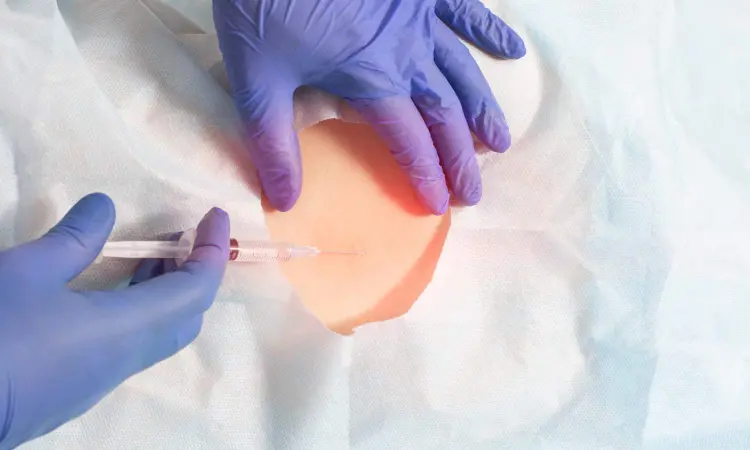- Home
- Medical news & Guidelines
- Anesthesiology
- Cardiology and CTVS
- Critical Care
- Dentistry
- Dermatology
- Diabetes and Endocrinology
- ENT
- Gastroenterology
- Medicine
- Nephrology
- Neurology
- Obstretics-Gynaecology
- Oncology
- Ophthalmology
- Orthopaedics
- Pediatrics-Neonatology
- Psychiatry
- Pulmonology
- Radiology
- Surgery
- Urology
- Laboratory Medicine
- Diet
- Nursing
- Paramedical
- Physiotherapy
- Health news
- Fact Check
- Bone Health Fact Check
- Brain Health Fact Check
- Cancer Related Fact Check
- Child Care Fact Check
- Dental and oral health fact check
- Diabetes and metabolic health fact check
- Diet and Nutrition Fact Check
- Eye and ENT Care Fact Check
- Fitness fact check
- Gut health fact check
- Heart health fact check
- Kidney health fact check
- Medical education fact check
- Men's health fact check
- Respiratory fact check
- Skin and hair care fact check
- Vaccine and Immunization fact check
- Women's health fact check
- AYUSH
- State News
- Andaman and Nicobar Islands
- Andhra Pradesh
- Arunachal Pradesh
- Assam
- Bihar
- Chandigarh
- Chattisgarh
- Dadra and Nagar Haveli
- Daman and Diu
- Delhi
- Goa
- Gujarat
- Haryana
- Himachal Pradesh
- Jammu & Kashmir
- Jharkhand
- Karnataka
- Kerala
- Ladakh
- Lakshadweep
- Madhya Pradesh
- Maharashtra
- Manipur
- Meghalaya
- Mizoram
- Nagaland
- Odisha
- Puducherry
- Punjab
- Rajasthan
- Sikkim
- Tamil Nadu
- Telangana
- Tripura
- Uttar Pradesh
- Uttrakhand
- West Bengal
- Medical Education
- Industry
Epidural Analgesia Not Directly linked to Postpartum Hemorrhage, reveals study

Researchers have found in a new study that Epidural analgesia is not directly linked to increased postpartum blood loss. However, it is more commonly used in high-risk obstetric cases, which are themselves associated with a greater incidence of PPH. Thus, the underlying obstetric complications, not the epidural itself, are the likely cause of increased blood loss.
Epidural analgesia is widely used for pain management during labor and delivery with inconsistent results regarding its influence on postpartum blood loss. Aim of our study was to investigate blood loss after vaginal delivery in women with epidural analgesia in consideration of established risk factors for postpartum hemorrhage and by using a validated blood measurement technique.
This prospective study was performed at the University Hospital Zurich. Included were 699 women with vaginal deliveries after 34 weeks of pregnancy. Blood loss was assessed by a validated measurement technique. Risk factors for increased blood loss were assessed and stratified by epidural analgesia use. Significant variables were entered into a stepwise multivariate regression analysis. RESULTS: In the univariate analysis, women with epidural analgesia showed a significantly higher blood loss, compared to women without epidural analgesia. However, after multivariate regression analysis no association between increased blood loss and epidural anesthesia was observed.
Furthermore, women with epidural analgesia were more often primiparous, experienced more often uterine atony and postpartum hemorrhage, bleeding from perineal laceration, vacuum extraction, longer second stage of labor and bigger neonatal head circumference. Epidural analgesia itself is not associated with increased postpartum blood loss. However, there is a higher incidence of PPH in deliveries with obstetric risk factors, in which more frequent use of epidural analgesia is observed. In other words, not epidural analgesia is the cause of PPH, but difficult obstetric settings are associated with both higher use of epidural analgesia and increased blood loss.
Reference:
Sachs, Maike Katja, et al. "Epidural Anesthesia During Labor and Delivery and Postpartum Hemorrhage." Journal of Perinatal Medicine, 2025.
Dr. Shravani Dali has completed her BDS from Pravara institute of medical sciences, loni. Following which she extensively worked in the healthcare sector for 2+ years. She has been actively involved in writing blogs in field of health and wellness. Currently she is pursuing her Masters of public health-health administration from Tata institute of social sciences. She can be contacted at editorial@medicaldialogues.in.
Dr Kamal Kant Kohli-MBBS, DTCD- a chest specialist with more than 30 years of practice and a flair for writing clinical articles, Dr Kamal Kant Kohli joined Medical Dialogues as a Chief Editor of Medical News. Besides writing articles, as an editor, he proofreads and verifies all the medical content published on Medical Dialogues including those coming from journals, studies,medical conferences,guidelines etc. Email: drkohli@medicaldialogues.in. Contact no. 011-43720751


